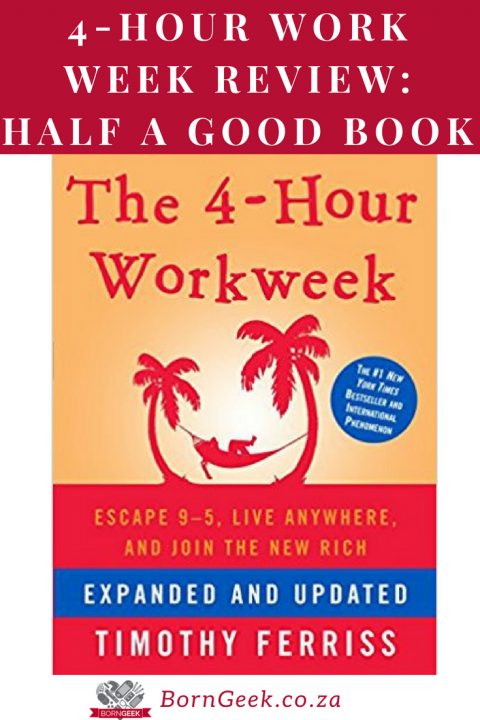I recently listened to the audiobook for the 4-Hour Workweek. It started off so strong, so interesting, I really enjoyed it. By the time I got to the end, I was rather less impressed, but I thought I’d share some of the good and bad.
I don’t normally call my collection of opinions a review, but I decided to go for it. I mean, it might not be a comprehensive, highly critical review the likes of which I’d give in my old job as a games journalist, but I’m sure it will help you know if it’s worthwhile for you.
(Full disclosure: I listened to the book for free with Libby. Also, I include some affiliate links below. If you click on them, I might be paid when you make a purchase. This in no way changes the content of what I write.)
What I liked about the 4-Hour Workweek
I really liked the premise of the book. Mainly, that we shouldn’t just work all our lives for the hope of an eventual retirement. Instead of waiting to retire to really enjoy life, it’s better to spread out mini-retirements throughout your life.
If you knew that you could never retire, what would you do? If you had 100 million in the bank, what would you want to do with your time?
While buying cool stuff or traveling the world would be amazing, most of us want some kinds of other pursuits. Whether it’s hobbies or passions, we all have things we enjoy. So, the idea is to spend more time on that now, instead of delaying life.
I particularly like how the book approaches formulating goals, called “dreamlines”. Five year plans are too long, promoting the “one day” procrastination. Instead, readers (or listeners in this case) are encouraged to make 6-month or12-month dreamlines. By thinking short term, it’s easier to be clear with goals.
The book suggests dividing the goals into have, be, and do.
So, for example, have a fancy sports car if that’s your thing, or new tech toys. Being would include being fluent in a new language or being able to cook. Doing might include travel, unique experiences, etc.
Make your list of 3-5 things in each section, and be really out there. If you dream of spending a month in Thailand, don’t put on your list that you want to visit someplace a few hours away. Be honest, be selfish and go big with the dreamlines.
Once you have the main list, choose three that are your main goals, and decide on actions that you can take RIGHT NOW to achieve them.
I really like this part of it. You don’t just imagine owning a fancy car, find your nearest dealership. If there are costs involved, like language lessons or pricings for fancy stuff, find them out and spread them out over the 6-12 month period as applicable.
By making the goals more tangible, and then outlining steps that you can take to move in that direction right now, and again tomorrow, it makes your dreams not just imaginable, but attainable.
What I didn’t like about the 4-Hour Workweek
There’s a lot of talk about removing yourself from the money making cycle. Minimizing your time spent in an office, generating automatic income, etc. It sounds really great when he talks it up throughout the book, but the actual details of what this means didn’t really resonate for me.
First of all, a lot of the focus is on getting out of an office and being able to work remotely.
I already do that. It’s also about working effectively and not wasting time. While it was an important reminder to stay on task when I’m working, I already do that, too. Maybe those sections would be more useful for the traditional 9-5 office worker, but if you can already work from home and you already know to avoid time traps like email or social media, this might not help you much.
He also encourages medical tourism and using exchange rates to your advantage. While I’ve done this, and agree with it to an extent, it also makes his book almost useless if you’re in a country with a low-value currency.
My gripe comes with the money making itself.
While the 4-Hour Workweek encourages you to work within your niche, which is something I definitely agree with, I found the rest of the ideas to be pretty hollow.
Instead of encouraging creativity, he encourages outsourcing product development and just being a reseller. Readers/listeners are encouraged to white label existing products or be an affiliate.
By far, my biggest gripe comes with his explanation of how to sell intellectual property. He advocates finding your niche and then becoming an expert. What to do if you’re not an expert? Read a couple best selling books in your niche and some relevant articles. Paraphrase them all in one page. Give this as a lecture for free at a local university or college. Then pitch yourself as a university lecturer and give another free lecture or two at massive corporations in your area. Sign up to sites used by journalists to find experts in a field.
While he doesn’t explicitly say to become a charlatan, it certainly starts to feel this way.
And then when you consider the rest of the book, it feels like he almost did that. He must have found some excellent content about formulating goals and working effectively and rephrased those books or articles in a great way. Then just self promoted.
There’s also a huge point of privilege in the book. Not everyone has the resources to do what he encourages. Not everyone owns the assets the way he describes to fund activities he encourages. Yes, the book breaks things down in a way that I like and appreciate, but that doesn’t mean it’s even applicable to large portions of society.
So what do I think?
In sum, I think the first half of the book is really great. Truly, if you’re feeling a bit directionless, or starved for time (which was my main appeal here), it’s well worth the read/listen. But stop before he starts getting into the details of how to get things done. Also, even the updated version feels very out of date thanks to new tech appearing and old tech disappearing, so all his recommended sites and services just don’t have the same appeal to them.
That’s my 4-Hour Workweek review. Have you read the book? What did you think of it? Do you like these dreamlining/goal-making ideas as much as I did? Want to know what I dreamlined? Drop me a comment below!
DID YOU LIKE THIS POST?
If you like these words, please check out more of what I say on twitter and Facebook, and pics I take on Instagram and subscribe to my YouTube channel and follow me on Pinterest.
Also, please be sure to sign up to my carefully curated, crafted and infrequent newsletter.





